
views
Setting Out

Assess your physical fitness. It's easy to look at the Olympians on TV and think, "I could do that!" Well, if you're reading this with a bag of chips in your lap and a soda bottle at your side, you may want to think again. This is serious stuff. People dedicate years of their life to reach the Olympics. Are you willing to do the same? That being said, different Olympic sports require different types of fitness, flexibility, and skill. Swimmers, football players, and sharpshooters have very different training regimens.

Choose your sport. So, here's the thing: you probably want to choose a sport you've been doing for a while. This whole 10,000 hour, 10 years of practice thing isn't 100% true, but it's not far off. The typical Olympian plays the sport for anywhere from 8 to 19 years before reaching the Olympics. Most Olympians started young, playing sports in primary school. If you are over 30 and do not have competitive sports experience, consider archery, shooting, or curling. It's much easier to make it to the Olympics in less popular sports. Fewer than 1 in 30,000 U.S. competitive basketball or tennis players make it to the Olympics, compared to about 1 in 100 judo competitors. That said, you may not get a choice: it's almost impossible to get to the Olympics in a sport you haven't fallen in love with.

Prepare for long term training. Future Olympians dedicate thousands of hours to the sport. Here's a rough example of a typical training schedule: When first introduced to the sport as preteens: 250 hours of training per year, over 6 months. After making the junior national team as teens: 600 hours per year over 9½ months. After making the Olympics team in late teens or twenties: 1100 hours per year over 11 months.
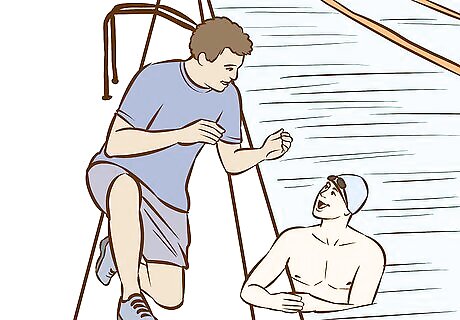
Get a coach. Most Olympians say that coaching is the most important factor for success, and recommend it even before you compete at a local level. A coach helps you train effectively and without injury, teaches you new tactics and strategies in your sport, and guides you through the world of competitions.

Keep your job. Finances can be a serious limitation for elite athletes The further you get in a sport, the more you'll spend on coaching, equipment, and travel. It's so common for the parents of Olympic hopefuls to go broke that the US government is looking into a program to help them. You may be able to get a college scholarship or athletic sponsorship at some point, but many Olympic sports do not have major opportunities in these areas. If you can, get a job that supports your training, such as working at a gym or pool. Doing some coaching yourself is a great way to stay immersed in your sport. Flexible hours are another huge benefit, as you'll need some serious time off once you're competing at a national or international level.

Have the dream. You know how they say if you want to be an actor, you can't have a plan B? How if you want to be anything that takes work, you have to want it and nothing else? Being an Olympian is one of these things. You have to want it so bad you eat, sleep, and breathe it. You have to dream about it at night. This is not a Sunday afternoon hobby. You can't get there without a team. Family, fellow athletes, coaches, and all the supportive people in your life will help you stay motivated and make your dream possible. Usain Bolt Usain Bolt, Olympic Sprinter Reaching your goals requires dedication and effort. "Dreams are free. Goals have a cost. While you can daydream for free, goals don’t come without a price. Time, Effort, Sacrifice, and Sweat. How will you pay for your goals?"
Getting Serious
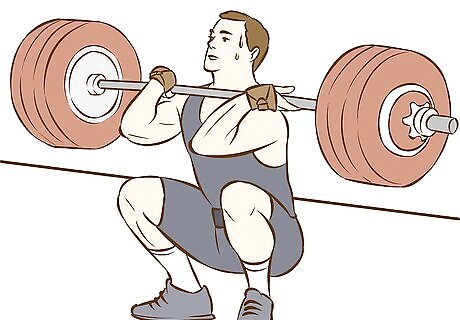
Train hard but smart. During the training season, elite athletes often train six days a week, but that doesn't mean constant workouts. In weightlifting, for example, a training day might involve only two hours of lifting and eight hours of recovery and active rest. Your body needs recovery time to get stronger and healthier, and pushing too hard is a path to the hospital, not the Olympics. Cross training is another valuable part of training. Depending on your sport, you'll dedicate varying amounts of time to flexibility, strength, and endurance training. The exact training schedule depends on your sport, which is part of why a coach is so valuable.
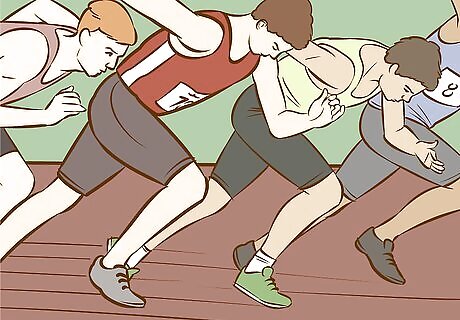
Compete. It's all well and good to have a coach, to be practicing every day and to be super serious about it, but then you gotta put your skills up to the test. In many sports, it's the only way to climb up the ladder and eventually get noticed (loads of Olympic sports don't have "tryouts"). So start locally, go regional, and eventually hit Nationals! The more you do something, the easier it becomes. Imagine having the Olympics be your first competition! Getting loads of competitions under your belt, even small ones, will prepare you mentally.

Monitor your life 24/7. You're not training a few hours a day — you're training 24/7. Everything you do will determine your progress, performance, and success. This takes diligence, perseverance, patience, mental stability, and discipline. Here's why: Your diet. Everything you eat affects you. Load up on carbs at the wrong time and your workout could crash and burn. Too much caffeine and you're not sleeping. Too much or too little of anything that keeps you from performing at 110% is off limits. Sleep. Most Olympic hopefuls get 8 to 10 hours of sleep every night, and often take a 30 to 90 minute nap during the day. Your body needs downtime to repair and recharge after intense exercise. Your lifestyle habits. If you're downing a 40 of PBR between bong hits, this isn't for you. Let's just leave it at that. Stick to your routine. "Olympians have to endure significant hardships over the years until the Olympics. I'm working hard for the Olympic trials and creating my training routine. It will include significant amounts of sleep, an extremely healthy diet, and careful budgeting." - Nick S. Take your training seriously. "I always wanted to be a volleyball player or a 100m sprinter because I have been doing these sports my entire life. I wasn't taking the training very seriously until my coach showed me this article and I read it 6 times. I realized that I still have a chance if I commit to my practice. I’ve redoubled my efforts and now plan to be on the Olympic team!" - Jake P. We want to hear from you! Advice from our readers makes our articles better. If you have a story you’d like to share, tell us here.

Get financing. If you've been competing for a while, it's possible you'll get noticed. The cream of the crop usually gets at least some money for their time, either from sponsors or from your sport's governing board. Don't expect to make big money, but do keep an ear out for opportunities. Because of that, look into being a part of your sport's NGB That's the National Governing Board for whatever it is you're doing. The more you make yourself known, the better.
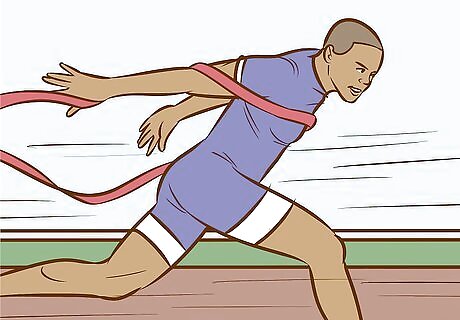
Set goals. Concrete, achievable, short-term and long-term goals. You need things to work toward that aren't "being awesome" or "training every day." There are records that deserve breaking. There is competition that can be quantified. So set goals for this week. Set goals for this month. And set goals for this year. It'll align your efforts like none other. The great thing about this is that you'll probably be dealing with a lot of numbers. Whether it's going faster, harder, or doing more, there's a number associated with it. So keep an eye on yourself and what you're capable of. If you know where you started, you know where you've gone — and where you can go.

Evaluate yourself honestly. Millions of athletes are good enough to compete at some level. To know if you're made of Olympic-quality stuff you've got to look at yourself realistically. How do you compare? How long will it take you to start comparing? Is the time investment worth it? What has your progress been like? What's feasible? What's coach have to say about it? It's important to do this on the regular. It takes the fun out of it, sure, but you're making a decision that affects years of your life. You have to know where you stand at any given point in time. You must develop the ability to take feedback, evaluate your progress, and understand what sacrifices need to be made if you wish to continue.

Let go of your social life. The Olympics aren't always tomorrow. There will be times when you're just training to get better. Those are the days where it'll only take the majority of your day! Then there's the time when the Olympics are six months away and it's your entire life. Prepare yourself mentally for a full-time job away from your family and friends. It's not gonna be easy. There will be days when it feels like it's not worth it, too. Those are the days when you gotta grab your mind by the corpus callosum and wrestle it into submission. You haven't done all this work for nothing. You can go back to drinking boxed wine and watching bad movies with your non-athlete friends later.
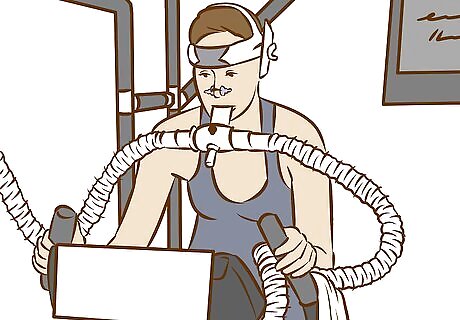
Know pain. You don't necessarily have to love it, but you have to know it, tolerate it, and even sometimes ask for it. As the author and runner Haruki Murakami wrote, it's because of pain that "we can get the feeling [...] of really being alive." You won't be able to lift your arms above your head some days. But the feeling will pass, and the next time it happens, it won't feel so bad. Injury is not a laughing matter here. We're talking wasting years of your life if you get hurt. And sometimes, sure, it takes a little pain to prevent a lot of pain. If you take one thing away from this, it's be safe. Never hurt yourself so hard you can't come back from it. Know what you're body can handle and what it can't. And be careful.
Going for a Medal

Attend national championships. For many, national championships in their sport is the key to the rest of their career. It's there that you may get scouted for the Olympics and secure the next couple years of your life. So once you've gotten all the smaller competitions out of the way, it's about time to go big or go home. Not all sports work the same way, of course. Some sports have Olympic trials and some even have tried-and-true tryouts. But being on a national team, while not a guaranteed way to get into the Olympics, is a pretty darn good step.

Find a country to represent. You can only represent a country that accepts you as a citizen — but once you're an elite athlete, it's not hard to make that happen. Some teams have extra requirements, but if you have an ancestor from a foreign country, look into competing under that nation's banner. There may be teams you haven't even heard of that don't require you to get a new citizenship. For example, U.S. citizens can compete in the name of Guam, the Marshall Islands, or American Samoa — and there's almost no competition for those spots.
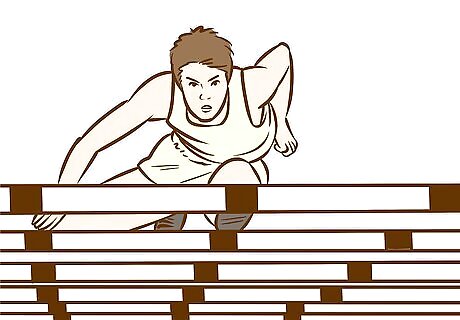
Qualify for and dominate the Olympic trials. Again, though not all sports are the same, you may have to participate in the Olympic qualifying trials. And there you must be in the top of those participating — not just do well. Once you score in the top of your sport, you're officially in! WAHOO! Look at you go. Okay, that's not necessarily true. Take boxing, for example: even if you dominate the trials, you may still have to participate in a national tournament (new regulations you can imagine competitors aren't super happy about). But even in these corner cases, doing well in the trials is a major boost.

Get used to traveling. Between competitions, camps, and visiting different training centers, you may be traveling all the time. Not only does this cost a pretty penny, but it can be quite exhausting in its own right, too. It's hard on relationships and it sucks living out of a suitcase, but you'll get to see the world — although mostly through a plane window.

Consider moving to an Olympic training center. Many countries have dedicated facilities for training Olympic athletes. These offer access to top-level trainers and equipment, and introduce you to the international community in your sport. some training centers even offer living space to athletes, which can be a big financial help. Olympic Training Centers in the US are located in Colorado Springs, Lake Placid, and Chula Vista.

Rest. No joke. Many Olympians take it a little easier as the Olympics approach. "A little easier" here is, of course, way harder than any normal person would ever dream of, but still. You don't want to hurt yourself, burn out, or otherwise risk your chances. So relish it. The hard stuff is coming up. You deserve a little downtime right about now.

Visualize success. Visualize every step of the process and how you want it to play out. Visualize every inch of your event, every placement of your body, every smile you want to make for the camera. Having it all played out in your head before you go on can be incredibly calming. Not freaking out is half the battle! Every serious athlete has their own "zoning" ritual. Yours could be meditation, yoga, or even jamming out to your own personal theme song. Whatever gets your brain in the right place is what you should be doing. You'll know it when you feel it!
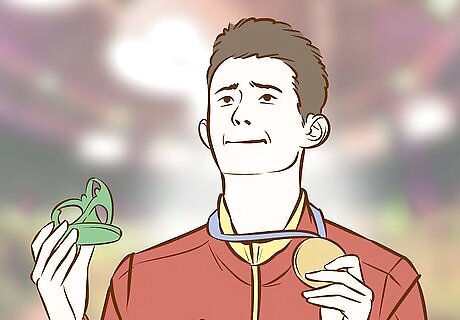
Have a heart. It's a little cheesy, but it needs to be said. Even the most naturally talented people fail when their hearts aren't in it. A decent athlete who wants nothing in the entire world but to win can best an athlete who's wishing he were somewhere else. So get your heart into it. It can make all the difference. Okay, if you're looking for something a little more scientific, we got it: a British study has come out that says it's not innate talent that's the end-all-be-all. "Differences in early experiences, preferences, opportunities, habits, training and practice are the real determinants of excellence." So if you don't believe cheese, argue with science. Even if you're not born the best, you can become the best.



















Comments
0 comment